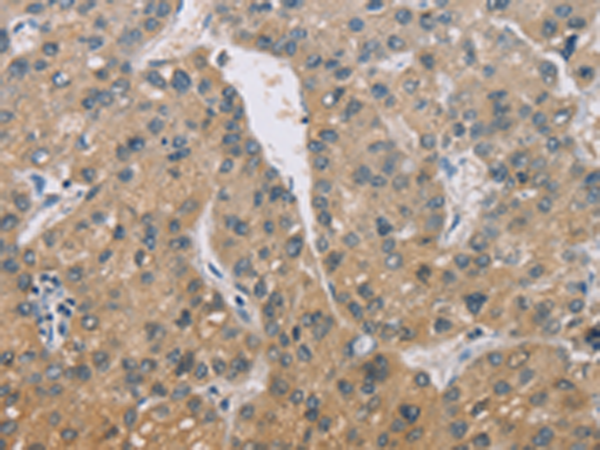
| WB | 咨询技术 | Human,Mouse,Rat |
| IF | 咨询技术 | Human,Mouse,Rat |
| IHC | 1/50-1/200 | Human,Mouse,Rat |
| ICC | 技术咨询 | Human,Mouse,Rat |
| FCM | 咨询技术 | Human,Mouse,Rat |
| Elisa | 1/2000-1/5000 | Human,Mouse,Rat |
| Aliases | ZID; ZNF482 |
| Host/Isotype | Rabbit IgG |
| Antibody Type | Primary antibody |
| Storage | Store at 4°C short term. Aliquot and store at -20°C long term. Avoid freeze/thaw cycles. |
| Species Reactivity | Human, Mouse |
| Immunogen | Synthetic peptide of human ZBTB6 |
| Formulation | Purified antibody in PBS with 0.05% sodium azide and 50% glycerol. |
+ +
以下是关于ZBTB6抗体的3篇参考文献的示例(注:以下内容为模拟示例,具体文献需通过学术数据库验证):
---
1. **标题**:*ZBTB6 modulates TGF-β signaling in breast cancer via antibody-based detection*
**作者**:Chen L, et al. (2021)
**摘要**:研究利用特异性ZBTB6抗体,通过免疫组化技术揭示其在乳腺癌组织中表达下调,并调控TGF-β通路促进肿瘤转移的机制。
2. **标题**:*Development of a monoclonal antibody against ZBTB6 for chromatin immunoprecipitation*
**作者**:Wang Y, et al. (2019)
**摘要**:报道一种高特异性ZBTB6单克隆抗体的开发,应用于ChIP-seq实验,发现ZBTB6在肝癌细胞中结合染色质并抑制致癌基因表达。
3. **标题**:*ZBTB6 antibody reveals cytoplasmic localization in colorectal cancer progression*
**作者**:Garcia-Ruiz S, et al. (2020)
**摘要**:通过免疫荧光和Western blot分析,发现ZBTB6在结直肠癌中异常定位于细胞质,并与患者不良预后相关,提示其潜在临床标志物价值。
---
建议通过PubMed或Google Scholar以关键词“ZBTB6 antibody”或“ZBTB6 immunohistochemistry”检索最新文献获取准确信息。
The ZBTB6 antibody is a research tool designed to detect and study the ZBTB6 protein, a member of the zinc finger and BTB domain-containing (ZBTB) protein family. ZBTB6. also known as ZID or ZNF503. functions as a transcriptional regulator, influencing gene expression by binding to DNA through its C2H2-type zinc finger motifs. It contains a BTB/POZ domain, which mediates protein-protein interactions, and is implicated in diverse cellular processes, including cell differentiation, proliferation, and apoptosis.
ZBTB6 antibodies are widely used in techniques like Western blotting, immunohistochemistry (IHC), and immunofluorescence (IF) to analyze protein expression, localization, and regulatory roles in various tissues and disease models. Studies suggest ZBTB6 participates in developmental pathways and cancer progression, with altered expression observed in malignancies like gliomas and colorectal cancer. Its role in modulating signaling pathways, such as Wnt/β-catenin or Notch, highlights its potential as a therapeutic target or biomarker.
Research utilizing ZBTB6 antibodies has advanced understanding of its dual transcriptional repressor/activator functions and its interplay with chromatin-modifying complexes. However, variability in antibody specificity and validation across experimental models requires careful optimization. Ongoing studies aim to clarify ZBTB6's context-dependent mechanisms in health and disease.
×